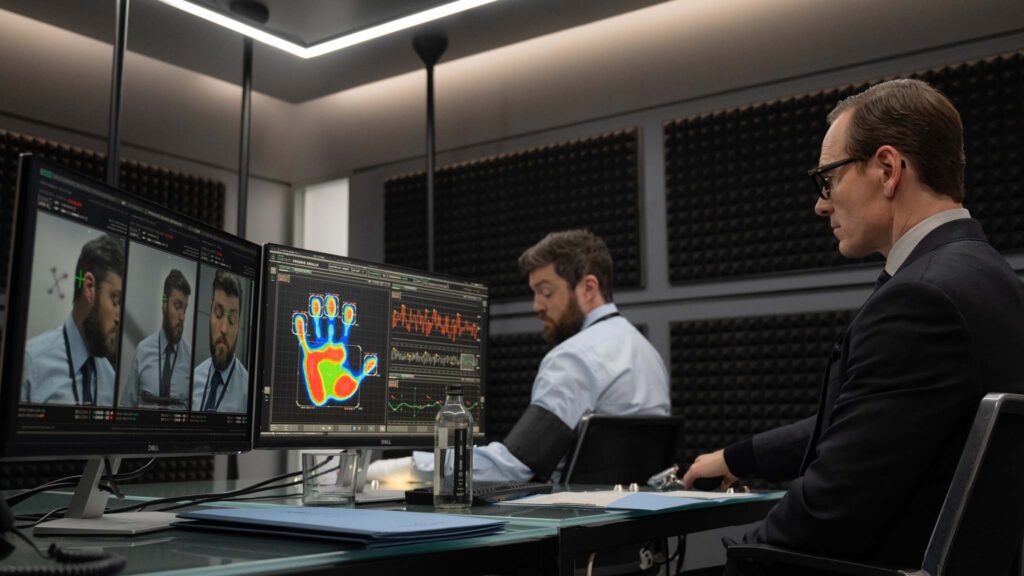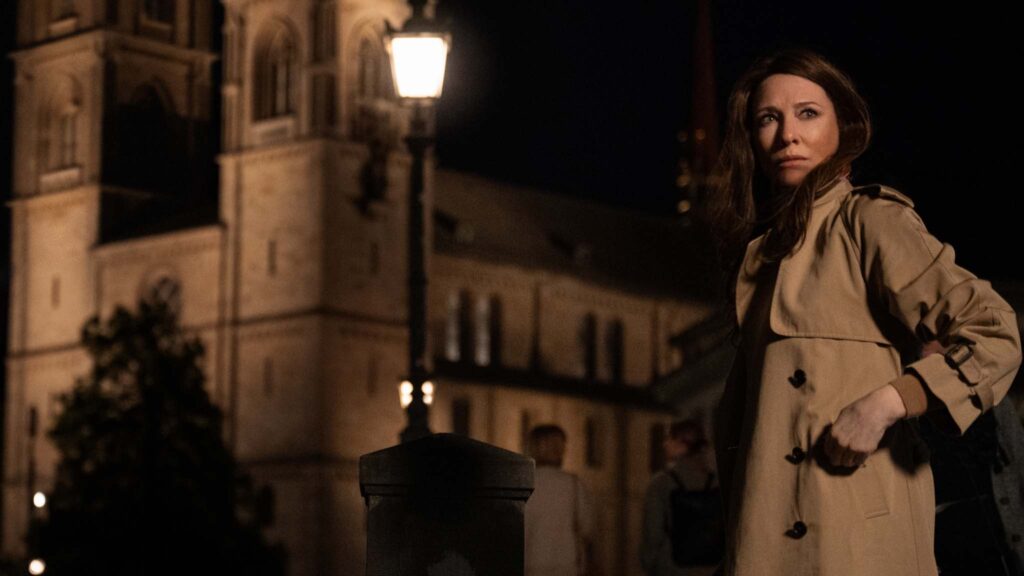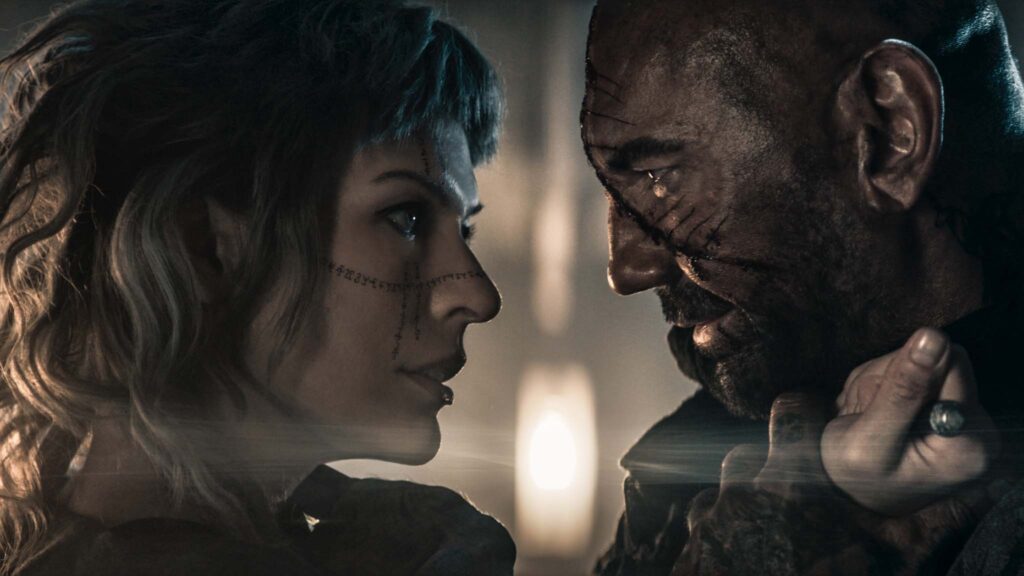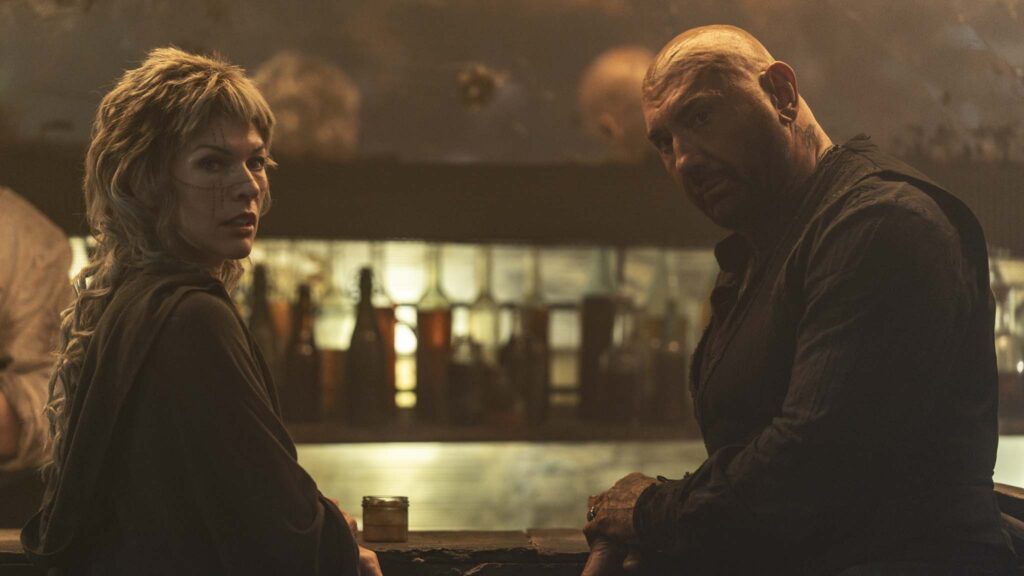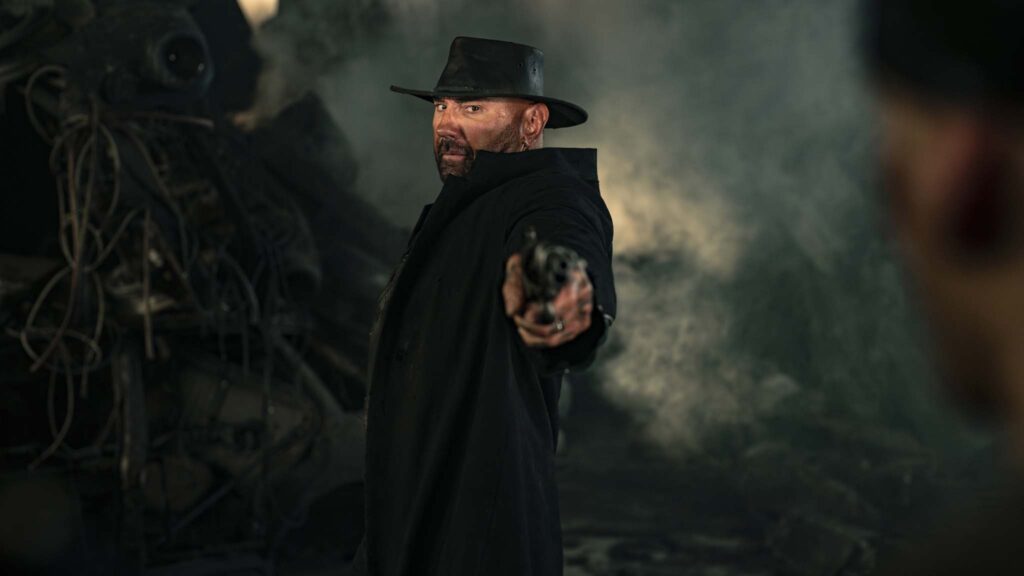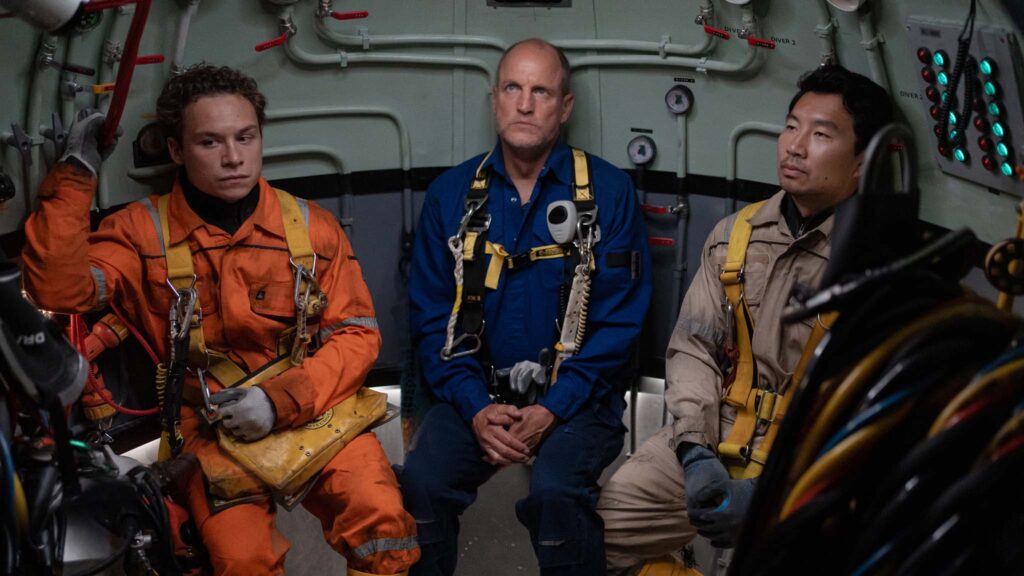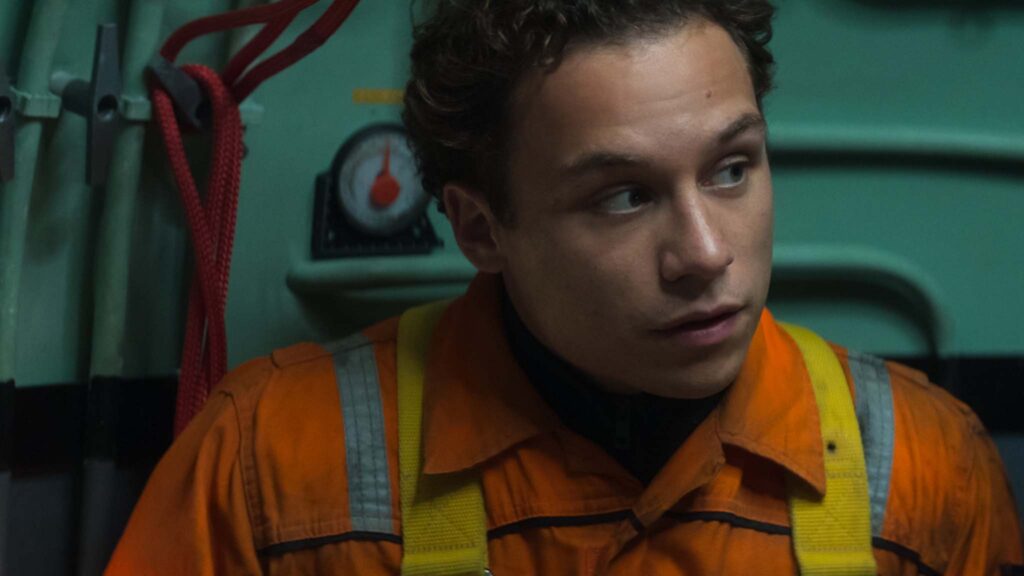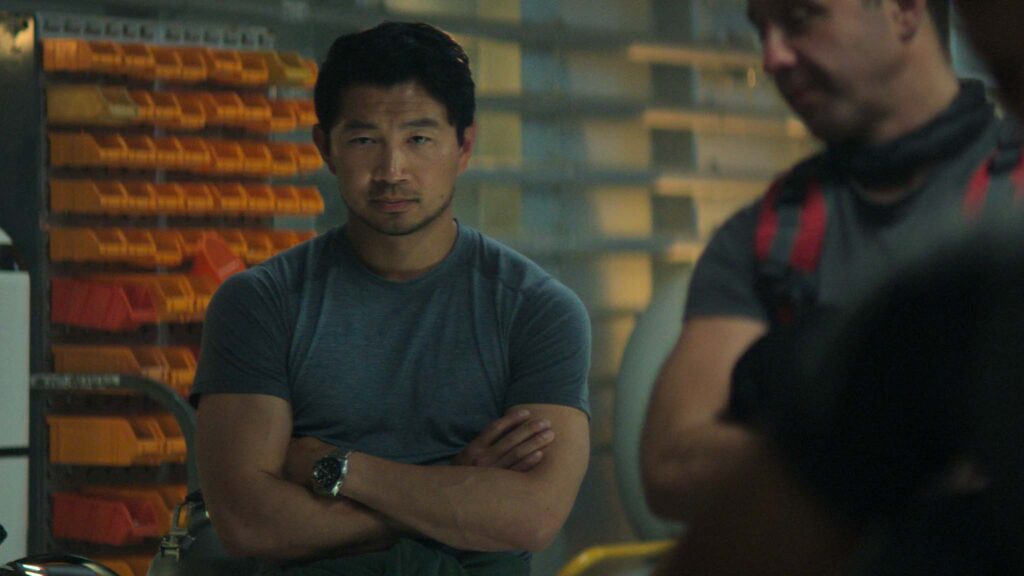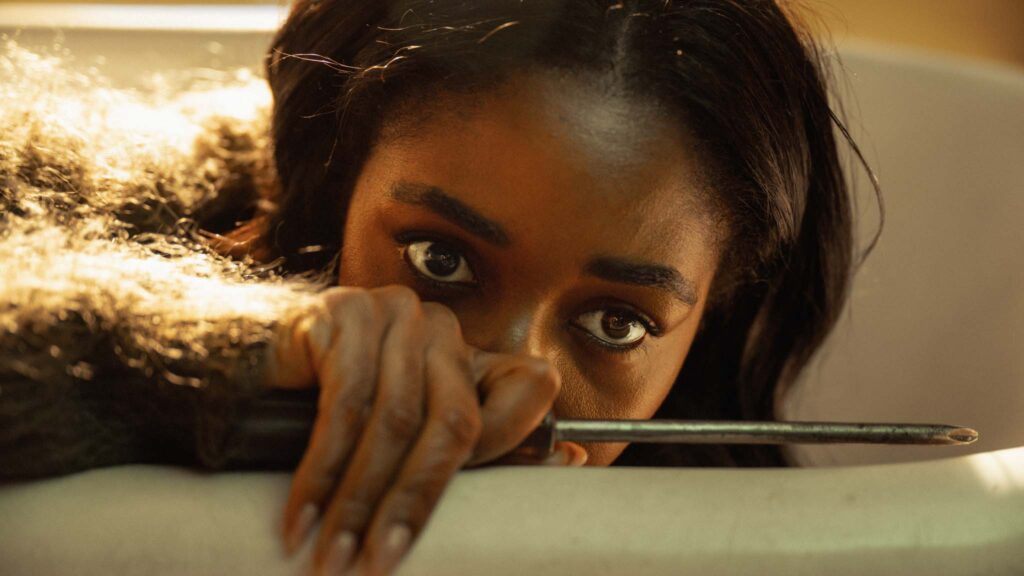Thriller
Black Bag (15)
Review: Black Bag is a dying breed: an elegantly constructed spy thriller with deeply satisfying narrative kinks that slowly feeds big-name actors into the emotional wringer and relies almost entirely on incendiary dialogue to inflict mortal wounds. David Koepp’s script restricts the pyrotechnics to one plot-driven explosion and a few meaningful pulls of a trigger. “This ends with someone in the boot of a car,” warns one spy. Director Steven Soderbergh obliges with shots of a vehicle driving down a country lane towards a fishing lake, captured from behind.
In the high-stakes world of global espionage, a black bag is a clandestine operation to gather valuable intelligence, which may involve bypassing security measures to gain access to privileged information. Characters in Soderbergh’s picture are trained to lie and deceive and they run black bags on each other. Loyalty to your country comes above everything, but when a target turns out to be the person you married, every victory is also a potential loss. Michael Fassbender and Cate Blanchett are impeccably cast as husband and wife, who both work for the National Cyber Security Centre (NCSC) and privately admit they would defy orders and kill for each other. They could be fibbing. The vow is tested as cogs of an ingeniously twisty plot whir into action.
Soderbergh opens with an unbroken shot around a packed London club to quickly establish betrayal close to home. “Some things really are best kept under the rug,” observes Fassbender’s master of polygraph analysis. Black Bag repeatedly pulls the rug from under us and the resulting disorientation is delightful. High-ranking NCSC officer George Woodhouse (Fassbender) receives confirmation from colleague Meacham (Gustaf Skarsgard) of a mole in the ranks. The duplicitous double agent is responsible for stealing NCSC’s prototype cyberweapon Severus.
A five-strong list of suspects includes George’s wife Kathryn St Jean (Blanchett), newly promoted Colonel James Stokes (Rege-Jean Page) and his girlfriend NSCS psychiatrist Dr Zoe Vaughan (Naomie Harris), Freddie Smalls (Tom Burke) and his girlfriend NSCS communications specialist Clarissa Dubose (Marisa Abela). To expose a traitor, George invites the suspects to an impromptu dinner party and laces one of the dishes with a generous dose of truth serum. “What’s on the menu?” Kathryn asks her husband. “Fun and games,” he coolly responds.
Black Bag slowly tightens thumb screws on the characters, who cannot be trusted to say what they mean or mean what they say. Fassbender and Blanchett are seductive and slippery while Abela makes an indelible impact with her full-throttle performance as a pawn in George’s mind games. Soderbergh retains a firm grip on the glorious displays of mental gymnastics to steadily crank up the suspense, bookmarked by two charged conversations around a dining room table. Loose tongues spill secrets and some truths are hard to stomach.
Find Black Bag in the cinemas
Fantasy
In The Lost Lands (15)
Review: For a little over 30 years, Northumberland-born director Paul WS Anderson has been orchestrating wanton carnage on the big screen with a heavy saturation of retina-straining visual effects and slow-motion action. Many of his pictures began life as video games – Mortal Kombat, Monster Hunter, the Resident Evil franchise – and most showcase his wife, actor Milla Jovovich, kicking the butts of human foes and otherworldly creatures with acrobatic fervour. The couple extend their cacophonous collaborations with a fantastical adventure adapted by screenwriter Constantin Werner from George RR Martin’s short story set after the fall of mankind, when the last vestiges of our craven race are shoehorned together in a walled city under the tyrannical rule of an Overlord.
The Game Of Thrones author’s post-apocalyptic yarn is fed into Anderson’s meat grinder and what emerges the other end is disappointingly bland fare, filled with bombastic set pieces represented as signposted two-word locations on a hand-sketched map including The Rift, Fire Fields, High Bridge and Skull River. In The Lost Lands is heavy on the eyes and light on the brain, with a thunderous score from composer Paul Haslinger to complement the blitzkrieg of digital trickery. Some of these visual embellishments are unpolished and unconvincing. “If you’ve got the time and stomach for it, I’ve got a story for you,” growls Dave Bautista’s gunslinger-for-hire in the film’s opening refrain. If you have the time, I’d advise you don’t invest it in Anderson’s picture.
Powerful witch Gray Alys (Jovovich) grants wishes to those who seek her counsel and she incurs the wrath of the church led by The Patriarch (Fraser James), who accuses her of heresy at a time when people are openly rejecting religion. The Overlord’s young wife, Queen Melange (Amara Okereke), entreats the witch to steal the powers of a shapeshifter – a werewolf – who lives deep within the Lost Lands where ghouls and demons scavenge for flesh.
Gray Alys is powerless to deny the request, or a competing demand from Jerais (Simon Loof), captain of the royal guards. With seven days until the next full moon, Gray Alys hires Boyce (Bautista) as a sharp-shooting protector and guide. The two gallop on horseback away from the city with The Patriarch’s sadistic Enforcer (Arly Jover) in hot pursuit.
Into The Lost Lands strands us in the fire-scorched wilderness with two-dimensional characters spouting clunky dialogue. The episodic structure mimics levels of an unfinished video game and the rapid-fire editing reduces some stunt sequences, like an ill-fated cable car ride, to an uncomfortable, dizzying blur. Jovovich and Bautista’s mismatched buddy dynamic is inert, and increasingly baffling as the film stumbles towards a laboured and nonsensical reckoning.
Find In The Lost Lands in the cinemas
Thriller
Last Breath (12A)
Review: Film directors are rarely gifted an opportunity to remake their own work but Alfred Hitchcock masterminded two iterations of The Man Who Knew Too Much, 22 years apart, and Michael Haneke co-ordinated a shot-for-shot English-language remake of his diabolical 1997 home invasion horror, Funny Games. In 2019, Alex Parkinson and Richard da Costa co-directed the edge-of-seat documentary Last Breath about a team of saturation divers – professionals who operate underwater for extended periods in a pressurised chamber. The film combined archive footage, reconstructions, audio recordings and interviews to revisit an ill-fated September 2012 dive to the bed of the North Sea to repair a pipeline.
A nerve-shredding story of heroism provides rich source material for Parkinson’s solo narrative feature debut, distilling events that fateful day into a pulse-quickening adventure. The script, co-written by Parkinson, Mitchell LaFortune and David Brooks, wastes precious few seconds of a watertight 93-minute running time on dry land, quickly establishing key characters to allow us to spend a good hour holding our breaths along with stricken characters. Actors Finn Cole and Simu Liu completed intensive scuba training so cameras can linger close to their divers as they make split-second decisions to resolve a high-stakes predicament.
Saturation diver Chris Lemons (Cole) bids farewell to girlfriend Morag (Bobby Rainsbury) and boards the Bibby Topaz captained by Andre Jenson (Cliff Curtis). He is allocated to the same dive team as retiring veteran Duncan Allcock (Woody Harrelson) and lone wolf Dave Yuasa (Liu) as the ship travels into the eye of a storm in the North Sea and uses dynamic positioning to remain over a pipeline in need of repair, located 330 feet beneath the roiling surface. Chris and Dave descend hundreds of feet to the sea floor while Duncan remains in a diving bell and monitors umbilical cords supplying oxygen, electricity and communications to his teammates.
A fatal computer error leaves the Bibby Topaz drifting helplessly off course and Lemons’ cords are severed. He has around 10 minutes of oxygen. “I will come back for you,” promises Dave before he is yanked back into the dive bell with Duncan. They wait, with mounting dread, for Captain Jenson, first officer Hanna (MyAnna Buring) and dynamic positioning officer Michel (Josef Altin) to regain control of the ship.
Last Breath is a slickly engineered thriller that loses some of its buoyancy if you have seen the 2019 documentary and know how the story resolves. Cole, Harrelson and Liu are well-matched as desperate comrades at the mercy of Mother Nature’s fury, who accept the risks every time they head out to sea. Underwater sequences, shot in an 11-metre deep dive tank in Malta, are staged with weightless brio. The silence in darkened depths, where few safely venture, is hauntingly beautiful and agonising.
Find Last Breath in the cinemas
Thriller
Opus (15)
Review: Music is a global religion and its gods and idols have been preaching to the converted for decades. Congregations answered the call when Elvis Presley’s swivelled his hips, The Beatles twisted and shouted, Elton John said farewell to his yellow brick road, Spice Girls defiantly zigazig ahed, Lady Gaga teetered on the edge of glory, Taylor Swift shook it off and Harry Styles served generous slices of his watermelon sugar. The cult of musical celebrity claims multiple victims in a tantalising thriller written and directed by first-time filmmaker Mark Anthony Green, which simmers with tightly coiled menace like Blink Twice and Get Out.
John Malkovich is deliciously cast as a flamboyant, platform-booted pop star, who returns to the public gaze to exploit the social media circus that has pitched its tent in the three decades since his self-imposed creative exile. He sinks his pearly whites into Green’s meaty script, which takes satirical swipes at facets of popular culture but draws disappointingly little blood, especially in a haphazard final stretch that should – like a great pop song – leave us on a rhapsodic high.
Guitarist Nile Rodgers and The-Dream provide a songbook of groovy original music including infectious dance floor filler Dina, Simone (replete with Malkovich’s seductive vocals), which has been released to promote the film. Art imitates life imitates art on an infinity loop of pitch-perfect branding.
Alfred Moretti (Malkovich), known affectionately as the Wizard Of Wiggle, retreated from the public eye 27 years ago with a Guinness World Record for the highest-grossing global tour in history and has remained a tantalising enigma. His effusive agent, Soledad Yusef (Tony Hale), heralds the surprise drop of an 18th studio album, Caesar’s Request, with a listening party for honoured guests before the world basks in one of the great LPs of the modern era.
Gift basket invitations are delivered to TV show host Clara Armstrong (Juliette Lewis), powerful influencer Emily Katz (Stephanie Suganami), podcaster and former rock star Bill Lotto (Mark Sivertsen), veteran paparazza Bianca Tyson (Melissa Chambers), magazine editor Stan Sullivan (Murray Bartlett) and – curiously – his poorly treated junior writer, Ariel Ecton (Ayo Edebiri). The assembled throng travel to Moretti’s private compound in the Utah desert where they surrender mobile devices to protect “the authenticity of the experience” and are exposed to his cult-like doctrine.
Opus promises more than it ultimately delivers, but Green is a filmmaker with an intriguing, off-kilter vision, who isn’t afraid to get his hands messy in the slop of the human condition. Tension builds gradually, spiking with a deranged puppet show featuring the voice of Rosario Dawson. Edebiri’s sweet-natured scribe is one of few likeable characters in the escalating delirium but she feels underwritten, like a great verse missing a killer chorus.
Find Opus in the cinemas



